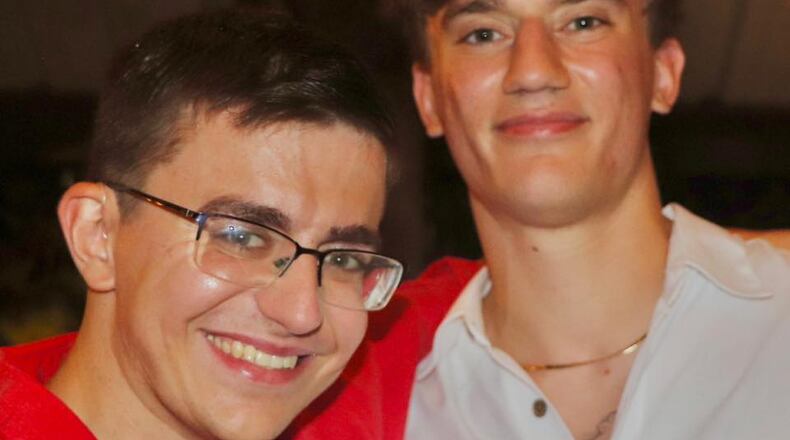Now in their 20s, the brothers were born in the Dayton area after their parents met at Wright-Patterson Air Force Base. Mark Jr. attends Wright State University, his parents’ alma mater, where he is studying rehabilitation services.
Matthew studied animation at the Columbus College of Art and Design and graduated in 2020. He lives in Florida with his parents, who moved there after his father retired from the U.S. Air Force.
“We both have roots pretty deep in Ohio,” Mark Jr. said.
Their health issues began in the winter of 2002 after their parents noticed symptoms including protein and blood in their urine. Their parents, Kathy and Mark Sr., learned of Alport Syndrome was a possibility, but there was not genetic testing available at that time to confirm it.
While in elementary school, Matthew and Mark Jr. started to lose their hearing, another symptom of Alport Syndrome. They each had to have hearing aids by the time they were in second grade, which was in 2005 for Matthew and 2007 for Mark Jr.
“It wasn’t until we were stationed at the Pentagon in 2015 that there was finally genetic testing available,” said Kathy Cipolla, a Brookville native and a former nurse.
They learned their father was the carrier of the Alport Syndrome gene and confirmed both Matthew and Mark Jr. had the condition.
“It always made us feel different than everyone else,” Mark Jr. said.
Last fall, Matthew started to experience more decline in kidney functioning. He suddenly went into end-stage renal disease in March and was hospitalized in the ICU at Sarasota Memorial Hospital Venice in North Venice, Fla., which included three days of intubation and emergency dialysis.
Once discharged, he started outpatient hemodialysis and transitioned to peritoneal dialysis in early June. The peritoneal dialysis is done at home while he sleeps every night, Kathy said. Mark Jr. will also have to go on dialysis this fall.
“At the end of the day, if we didn’t have dialysis, this would kill us,” Mark Jr. said.
But the dialysis is a lifesaving treatment for them, but not a cure, Kathy said.
Matthew’s blood type is O positive and Mark’s is A positive, so Matthew can only receive organs from an O donor, and Mark can receive from an O and A donors. Their parents were also each ruled out as potential donors.
The waitlist time for a kidney from a deceased donor is three to five years, but a surgery from a living donor can happen within a year after the vetting process to make sure the donor is a match and physically able to donate.
Until they are able to find a donor, the Cipolla brothers’ lives include undergoing dialysis, taking medications, and having fluid and dietary restrictions. Their travel is also restricted due to needing to be on-call for the possibility of receiving a deceased organ, and if they do travel, they will have to take their peritoneal dialysis equipment with them.
“It’s an incurable disease,” Kathy said.
Getting a living donor, though, would allow Matthew and Mark Jr. to live their lives more like normal 20-year-olds.
“It would give the boys a more stable life,” Kathy said.
To find out if you’re eligible to be a living kidney donor, sign up at www.onemedicalpassport.com/?fid=963 or call the Cipollas’ living kidney donor coordinator at 727-588-5618 at the Largo Medical Center in Largo, Fla.
Follow their health journey on their Facebook page, “The Cipolla Brother’s Quest for New Kidneys,” or on Instagram at cipollabros_need_a_new_kidney.
About the Author

